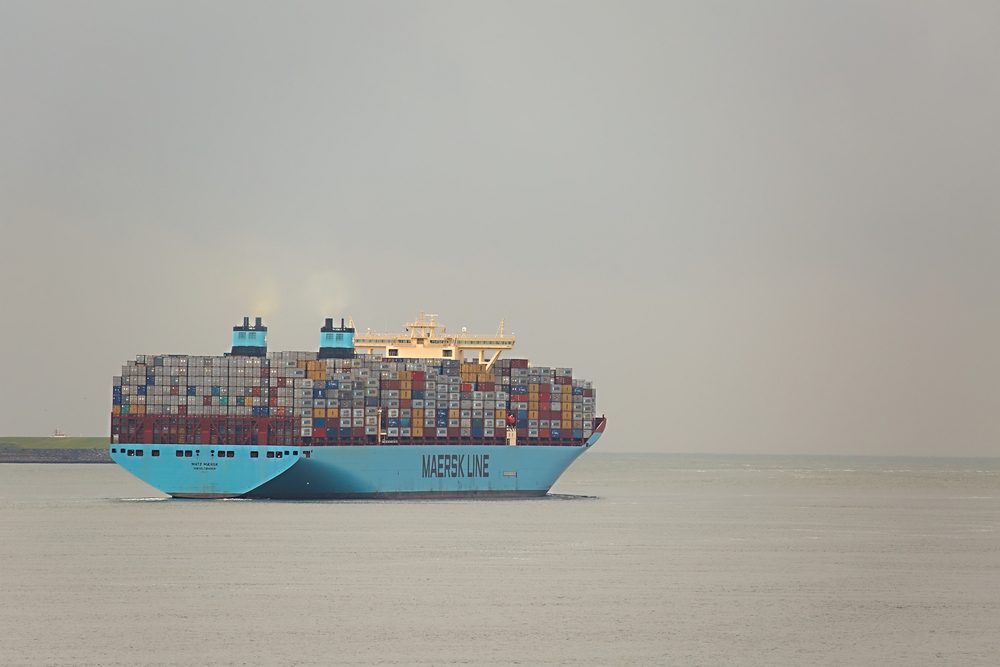India’s Oil Demand Drives CMB Tech Fleet Diversification
By Dimitri Rhodes Nov 7 (Reuters) – Belgian oil tanker company CMB Tech says it will focus on the fast growing market in India as it reported third quarter results...

Photo: Peter Gudella / Shutterstock.com
By Christian Wienberg (Bloomberg) — A.P. Moller-Maersk A/S is in an unusual place this year as the world’s biggest shipping company finds itself the target of an attack by hedge funds.
For years, there’s been no speculation against Maersk to speak of. In September, short positions represented just 0.8 percent of the Danish company’s stock. But with a trade war upending the outlook for the global container shipping industry, investors are reviewing their options.
Short interest in Maersk has jumped to about 6 percent of the share capital this year, according to data compiled by IHS Markit. That’s the highest level on record, with the data going back until 2006 (the numbers have been adjusted for the effect of dividend payments).
The global economy is now firmly in the grip of an escalating trade war. On Friday, U.S. President Donald Trump said he’s “ready to go” with new tariffs on $500 billion of Chinese goods destined for the U.S., which roughly corresponds to the value of all imports from China to America.
For a company that controls about a fifth of the world’s container fleet, which transports goods worth $4 trillion a year, the new wave of protectionism could be devastating. Maersk has already lost more than 20 percent of its market value this year as investors try to digest the changing landscape.
“There’s a lot of uncertainty over how container freight demand will develop during the remainder of the year, caused by the tariffs implemented on Chinese imports in the U.S,” David Kerstens, an analyst at Jefferies, said by phone. “Clearly there’s a risk the situation escalates and further impacts Transpacific trade flows.”
Maersk, which like other shipping companies is still trying to cope with the overcapacity that has weighed on the industry for the past decade, has been a vocal critic of Trump’s attack on free trade.
Maersk’s main shipping route is between Asia and Europe, with less exposure to direct trade between China and the U.S. So the fallout of a trade war between those two countries on its business has been limited, to date.
World’s Biggest Shipping Firm Battered by Escalating Trade War
But that may change “if the situation further escalates and affects other routes, including Transatlantic trade,” Kerstens said.
AQR Capital Management is among funds now betting against Maersk. A July 18 regulatory filing showed the firm has a short position equal to 0.5 percent of Maersk’s share capital (the Danish regulator doesn’t identify funds with positions smaller than that). Greenwich, Connecticut-based AQR declined to comment, when contacted by phone.
“The fallout from tariffs on container shipping is likely to be pronounced,” Rahul Kapoor, a senior analyst at Bloomberg Intelligence, said. “We believe the best of trade growth is already behind and carriers will have to cut capacity at a rapid pace in order to arrest freight-rate declines if they have any chance of third-quarter profitability.”
Maersk shares continued their slide on Monday, declining as much as 3.1 percent in Copenhagen.
Meanwhile, Maersk is in the second year of an historic transformation with the aim of having a business that focuses on transport and has no energy assets. But the market “doesn’t attribute much value to the transformation at the moment” as the stock is “very much a macro play,” according to Kerstens.
At the same time, there’s concern that Maersk may struggle to achieve its full-year forecast for Ebitda, of $4 billion to $5 billion, due to rising costs. The average estimate in a Bloomberg survey of 12 analysts suggests Maersk will only reach $3.68 billion this year. Just four weeks ago, the average estimate pointed to an Ebitda of $4.16 billion.
“Fuel costs are up more than 20 percent year-to-date, negatively impacting profitability, as freight rates are 4 percent lower year-to-date,” Kerstens said. On the plus side, there are signs that container-fleet overcapacity is easing as fewer new ships come to market, he said. “That is the argument for the bull case,” he said.
Maersk, which publishes second-quarter results on Aug. 17, declined to comment. Back in May the company said “increased uncertainties due to geopolitical risks, trade tensions and other factors,” may affect its ability to deliver on its full-year guidance.
© 2018 Bloomberg L.P

Sign up for gCaptain’s newsletter and never miss an update

Subscribe to gCaptain Daily and stay informed with the latest global maritime and offshore news


Stay informed with the latest maritime and offshore news, delivered daily straight to your inbox
Essential news coupled with the finest maritime content sourced from across the globe.
Sign Up